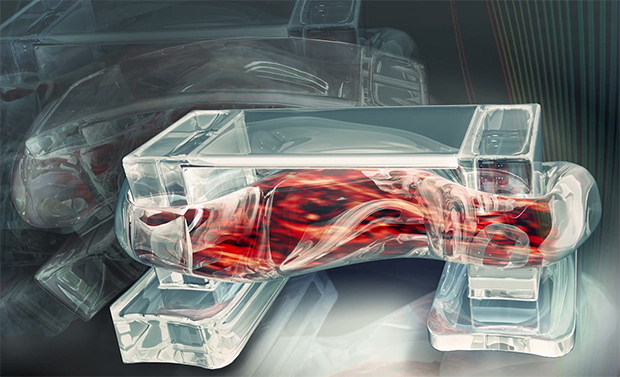With the official Ebola death toll approaching 5,000, scientists are increasingly concerned with exploiting all possible ways of fighting this deadly disease. While the biggest labs around the world are working on a vaccine that will hopefully exterminate Ebola once and for all, roboticists are developing more unconventional ways of preventing the spread of the disease.
Category Archives: Robots and Health
Wearable robots will take the burden from workers’ shoulders
Everybody has been in a situation when we wish we had stronger arms or, even better, an extra pair of them. Whether it is attaching something large overhead or manipulating something heavy, we all know we are bound to run into the limitations of our own anatomical design. In some professions, such as construction work, these difficulties can surface practically every day. To make physical drudgery less stressful and traumatic, researchers around the globe are now developing a new kind of robots that will be worn on the body just like your regular backpack.
Robots get muscular
A new breed of muscle-powered robots can walk on command
Robots can be very strong, fast and enduring. However, unlike in animals, none of this strength comes from muscle, instead robots mainly rely on electrical motors and other hard and generally inflexible parts. But with all the advantages that conventional robot hardware can deliver, it still does not match the ability of muscle-powered animals to provide an accurate response to different physical environments. To address this downside of robotics, a group of researchers, led by Professor Rashid Bashir, at the University of Illinois at Urbana-Campaign developed tiny walking bio-robots powered by engineered muscle tissue.
Robot suit gets people out of the wheelchair
Having spent almost ten years in a wheelchair after a car crash left her paralysed below the chest, Sophie Morgan was finally able to stand on her feet and walk again. What got her out of the wheelchair was not some kind of groundbreaking therapy, but a robotic exoskeleton developed by the New Zealand-based company Rex Bionics.
Continue reading
Neuroprosthetics: wearable tech inside the brain
Wiring electronic devices directly into your brain may not sound like a very pleasant idea, but this is exactly what so many scientists around the world seem to be quite excited about. The reason is that, far from being your worst cyborg nightmare, brain implants – also called neuroprostheses – can do true miracles. Connected to the nervous system, these little chips can make the blind see, the deaf hear and even allow the paralysed to once again gain control over the physical world.
Machines as Medical Mock-Ups
 In the near future, doctors may try out treatments on virtual versions of ourselves
In the near future, doctors may try out treatments on virtual versions of ourselves
Advances in medical technology have played a major role in increasing people’s average life expectancy.
Continue reading
Biomimetics: Where’s it at?
Researchers explore the state of the art of Biomimetics
Does it make sense to study the living to make machines? Or explore the intricate architecture of a shell to design a building? Within this field, scientists look to nature for their best ideas—we’re talking about Biomimicry. It’s a scientific field that blends a flow of ideas from the biological sciences into engineering. Biomimetic research is bringing together scientists from disciplines such as Neuroscience, Cell Biology, Computation, Psychology, and many others to produce new technologies that make sense in today’s ever-changing world.
Continue reading
Cognitive Skills for Rehabilitation Robots
 Europe invests in cognitive skills for rehabilitation robots
Europe invests in cognitive skills for rehabilitation robots
The European Commission has provided a grant for €780,800 to develop cognitive skills for rehabilitation robots being developed by CORBYS (Control Framework for Robotic Systems), a four year European project which began in February, 2011.
Continue reading
The 2012 Living Machines Conference
 Here’s a taste of what went on over the 3 day event organized by the Convergent Science Network
Here’s a taste of what went on over the 3 day event organized by the Convergent Science Network
Electro sensors inspired by fish who navigate their way through murky waters, robots that dance with the honeybees, and artificial muscles and blood vessels making their way into modern medicine. These are just a few of the research topics that were Continue reading
Racing with Robots
Ready, Set, Joggobot!
Running can be a challenging activity to get into and keep up. Whether it’s a friend or canine pal acting as a running buddy, the company often provides us with the motivation needed to push ourselves further or to get us out there on days when we’d rather not lace up those trainers. But since not everyone has a dog or an active friend, researchers at the Exertion Games Laboratory at RMIT University in Melbourne, Australia have recently created the Joggobot so you won’t have to be the lone ranger out there on the track!
Continue reading





